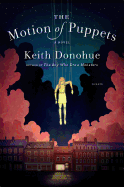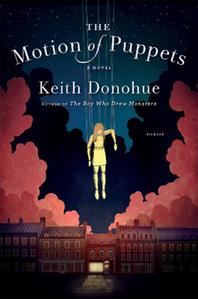
 With The Motion of Puppets, Keith Donohue (The Boy Who Drew Monsters) evokes a bizarre underworld with an array of mythological references in a story of lovers seeking reunion. Newlyweds Kay and Theo Harper have come to Quebec for the summer, where she works as an acrobat in a cirque and he wrestles with a work in translation between semesters teaching French literature in New York City. The first line of the novel reads: "She fell in love with a puppet." And this is where the trouble begins.
With The Motion of Puppets, Keith Donohue (The Boy Who Drew Monsters) evokes a bizarre underworld with an array of mythological references in a story of lovers seeking reunion. Newlyweds Kay and Theo Harper have come to Quebec for the summer, where she works as an acrobat in a cirque and he wrestles with a work in translation between semesters teaching French literature in New York City. The first line of the novel reads: "She fell in love with a puppet." And this is where the trouble begins.
A puppet shop in Quebec's Old City draws Kay's attention daily, but the door is always locked, the lights off. One night, when returning from a party after midnight, she fears she is being followed and, finding the door unlocked for once, slips inside. Theo contacts the police when she does not return home, but no trace can be found of her. The rest of The Motion of Puppets alternates between their two experiences. Theo searches Quebec all summer for his wife, then returns to New York City and his work, distracted and mourning. Meanwhile, Kay adjusts to new circumstances: she has become a puppet. Along with the other puppets shut away in the shop she once admired, she is able to speak and move on her own only between midnight and dawn--once she learns how to move again in her new body. Eventually, she takes pleasure in performing (with the help of a puppeteer) for audiences, as she had in the cirque. And she makes new friends, especially with the one puppet who also remembers and yearns for her human form.
This dreamy, sinister novel alludes widely to history, literature and legend. Theo's translation project is a biography of the photographer Eadweard Muybridge, whose work involved scientific knowledge of human and animal locomotion. Muybridge shot and killed his much younger wife's lover, a story that preoccupies Theo, also an ardent--if not clingy--older husband. One of Theo's colleagues is a professor of antiquities who is equally eager to find relationships between past and present. Most pointedly, however, Kay's predicament is a reference to the myth of Orpheus and Eurydice, in which Orpheus misses his wife so terribly that Hades agrees to let her leave the underworld and return to life with him, under one diabolical condition. In Donohue's novel, Theo's ability to save Kay from her incarnation as a puppet relies on his ability to trust her. But first, she must make him recognize her in her new form.
An engrossing novel of love, fancy and enchantment, The Motion of Puppets offers a perfectly wrought moodiness, detailed settings and an unsettling plot. Kay and Theo are underdeveloped as characters, but serve the mythic proportions of the story well. Smart, eerie and moving, this puppet show holds the potential to transport its reader to another world. --Julia Jenkins, librarian and blogger at pagesofjulia
Shelf Talker: This reworking of the myth of Eurydice features a woman locked in a world of sentient puppets.

